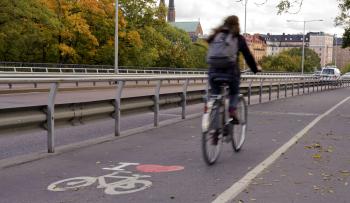
Helmets: An Attack on Spanish Cycling
Text in Spanish: 20 children are run over per year. Would you feel safer if your child wore a helmet? The danger for children are cars, not riding bicycles. Source: “Principal figures on road accidents in Spain 2010” www.dgt.es
This article is also available in Spanish here.
On October 4, 2013, the Spanish cabinet approved amendments to the existing Law on Traffic, Circulation, Motor Vehicles and Road Safety and has passed the proposed bill to Parliament for approval. Under the heading 'Improving Road Safety' is an amendment that could make bicycle helmets mandatory for all cyclists under the age of 18 on all roads (urban and rural).
Further Reading
- You can read the text of the amended traffic law (in Spanish) here.
- Find more information about ECF's position on helmets here, or read our previous article about the situation in Spain here.
With this law on the books, the Spanish government could easily move towards a mandatory helmet law (MHL) for cyclists of all ages without having to consult Parliament. Yet, opposition to the mandatory helmet law is total: all political parties (with the exception of the ruling People’s Party – although there is internal division within the PP itself on this issue), all cycling organizations, and many local governments are against the mandatory helmet law (including Madrid, Barcelona, Seville, Valencia).
ECF has also supplied documents and letters to the Spanish Transport Department supporting Spanish cycling organisations CONBICI and Acontramano. The helmet commission in the Spanish Parliament is still open but the results of the commission are not required by the government to be taken into account – therefore the Parliament may not wait for the commission to release their results before making a decision. If this is the case, the helmet commission will be rendered redundant.
What happens if this law is passed?
Based on the experiences of countries with mandatory helmet laws, the number of cyclists is likely to reduce with the introduction of a mandatory helmet law (Robinson 2008). Research in the field of cycling in Australia (a country with a MHL) has led to the conclusion that “the greatest effect of the helmet law was not to encourage cyclists to wear helmets but to discourage cycling” (Robinson 1996). By portraying cycling as a dangerous activity, MHLs dissuade people from cycling. Proponents of MHLs may retort that the purpose is to prevent head injuries or raise the relative safety of cyclists, not necessarily increase the number of cyclists. However bicycle helmets are not designed for hi-impact crashes with motorized transport, they are designed for falls from the bike; they will not protect heads in hi-impact crashes. If we look at this from a public health point of view the public health benefits of cycling far outweigh the costs from crashes. According to Piet de Jong a Professor of Actuarial Studies the smallest loss of cycling numbers will always bring a public health disbenefit even if MHLs were effective against all fatalities!.
MHLs could also, counterintuitively, make cycling even more dangerous. When the number of cyclists decreases, the relative safety of all cyclists decreases as well. It has been well documented that there is safety in numbers in regards to cycling (Jacobsen 2003).
There are a few main concerns regarding the economic effects of this mandatory helmet law, should it be implemented. Major cities in Spain have bicycle sharing systems which could be negatively affected by a mandatory helmet law. If we compare Spain’s bicycle sharing system with those in Australia, we can see how a mandatory helmet law impacts their use.
|
Name |
City |
No. of Bikes |
No. of Stations |
No. of long-term subscribers |
No. of times a bicycle is used per day |
|
Bike Share |
Melbourne |
600 |
51 |
1,237 |
0.3-0.4 |
|
City Cycle |
Brisbane |
2,000 |
150 |
|
0.35 |
|
Sevici |
Seville |
2,600 |
260 |
50,078 |
5.94 |
|
Bicing |
Barcelona |
6,000 |
420 |
113,787 |
5.8 |
Resources: concessionaires website and local press
Melbourne and Brisbane’s shared bikes have 0.3-0.4 uses per day compared to the average 5.5 uses per day in Barcelona and Seville (ConBici, slide 41). Mandatory helmet laws kill bicycle share programs – clients in Australia cite having to wear a helmet as a major barrier to using the bike share programme (Fishman et al., 2012). The potential for such a law in Spain could have a disastrous effect for the largely successful schemes in its major cities.
Within economics there is also the concern of how the helmet law will affect cycle-tourism. In Spain cycle-tourism’s estimated economic value 1.62bn Euros, compared to France’s 7.49bn, Germany 11.37bn (The European cycle route network EuroVelo, European Parliament Report 2012, p.36). “There are lots of reasons why introducing mandatory helmet laws would be ‘inconvenient’. Perhaps the biggest reason is that those countries that have introduced such laws have seen a decrease in the number of people cycling. This in turn makes it more dangerous for those cyclists that are left because other road users are not used to them. Hardly attractive for a potential cycle tourist” (Ed Lancaster, EuroVelo Project). Spain has a lot going for it in terms of tourism, and could easily increase its net-worth in this field – a MHL will only set them back even further.

How does a mandatory helmet law impact health?
Biking is a great form of exercise, and regular cycling (such as commuting) is a great way to include exercise in our daily lives. If mandatory helmet laws reduce the number of people cycling, and decrease the safety of those left cycling, there will be a net negative effect on the population’s health (De Jong 2012). “Thanks to superior cardiovascular fitness, the average cyclist outlives the average noncyclist, helmet or no helmet. Ultimately, helmet laws save a few brains but destroy many hearts " (De Marco 2002).
Helmets do not prevent accidents.
Good infrastructure and awareness campaigns do. The ECF is not against wearing helmets but we are against mandatory helmets. We are against the portrayal of cycling as a dangerous activity. In the European context, Spain would be one of the very few EU countries to have a MHL (some other countries have MHLs for under 15-16 and children). The European Commission does not see helmets as something that needs to be legislated for now or in the future.
If the public and political will in Spain is against such a law, why is the DGT pushing so hard to make this a reality? Who does a MHL benefit and what are the interests behind this?
You can follow the debate at ECF member Acontramano's website as well as on ConBici's website.
You can sign the petition against the Mandatory Helmet Law here.
Works Cited:
A Contramano. Asamblea Ciclista de Sevilla. El casco obligatorio impide el desarrollo de la bicicleta pública http://goo.gl/5FTjNd
ConBici. (2013). http://www.slideshare.net/ConBici/ponencia-conbici-congreso-septiembre-2013
de Jong, Piet. (2012). The Health Impact of Mandatory Bicycle Helmet Laws. http://papers.ssrn.com/sol3/papers.cfm?abstract_id=1368064
de Marco, Thomas J. (2002). Butting heads over bicycle helmets. http://www.ncbi.nlm.nih.gov/pmc/articles/PMC117836/
European Parliament Report. (2012). The European Cycle Route Network Eurovelo: Challenges and Opportunities for Sustainable Tourism. http://ecf.com/files/wp-content/uploads/studiesdownload.pdf
Fishman, Elliot, Simon Washington, Narelle Haworth. (2012). Barriers and facilitators to public bicycle scheme use: A qualitative approach. http://www.sciencedirect.com/science/article/pii/S1369847812000733
Jacobsen, P.L. (2003). Safety in numbers: more walkers and bicyclists, safer walking and bicycling. http://www.ncbi.nlm.nih.gov/pmc/articles/PMC1731007/pdf/v009p00205.pdf
Robinson, D.L. (1996). Head injuries and bicycle helmet laws. http://www.sciencedirect.com/science/article/pii/0001457596000164
Robinson, D.L. (2006). No clear evidence from countries that have enforced the wearing of helmets. http://www.ncbi.nlm.nih.gov/pmc/articles/PMC1410838/
Turner, Luke. (2012). Australia’s helmet law disaster. http://www.ipa.org.au/library/publication/1335931523_document_helmets.pdf
About the Authors
Jesus Freire is a Policy Assistant at the ECF and part of A Contramano (Seville Cyclists Assembly). He is especially interested in road safety issues and bike sharing schemes.

Zoé Kruchten is a Communications Assistant at the European Cyclists’ Federation. She has a BA in International Relations and loves to fix bicycles.
ECF thanks Oclisé for the header picture: tourists visiting Seville by bicycle
Regions:
Topics:
- Log in to post comments
Contact the author
Recent news!
Upcoming events
Contact Us
Avenue des Arts, 7-8
Postal address: Rue de la Charité, 22
1210 Brussels, Belgium











